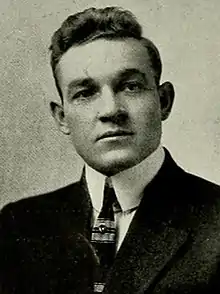C. W. Martin
Charles William Martin (September 17, 1887 – March 14, 1978)[1] was an American football player, track athlete, and sports coach. He served as the head football coach at the University of North Carolina at Chapel Hill for one season in 1912, compiling a record of 3–4–1.[2]
 Martin pictured in Yackety Yack 1913, North Carolina yearbook | |
| Biographical details | |
|---|---|
| Born | September 17, 1887 Wallula, Washington |
| Died | March 14, 1978 (aged 90) Walla Walla, Washington |
| Playing career | |
| Football | |
| ? | Whitman |
| 1910 | Notre Dame |
| Position(s) | End |
| Coaching career (HC unless noted) | |
| Football | |
| 1912 | North Carolina |
| 1930s–1940s | Whitman (assistant) |
| Track | |
| c. 1920 | Penn State |
| 1925 | Harvard |
| 1934–1969 | Whitman |
| Head coaching record | |
| Overall | 3–4–1 (football) |
Head coaching record
Football
| Year | Team | Overall | Conference | Standing | Bowl/playoffs | ||||
|---|---|---|---|---|---|---|---|---|---|
| North Carolina Tar Heels (South Atlantic Intercollegiate Athletic Association) (1912) | |||||||||
| 1912 | North Carolina | 3–4–1 | |||||||
| North Carolina: | 3–4–1 | ||||||||
| Total: | 3–4–1 | ||||||||
References
- Although Bill Martin played football and baseball at Whitman in the early years of the 20th century, track was his primary claim to fame. After blossoming into an extraordinary sprinter in two seasons at Whitman and its prep academy, he transferred to Notre Dame, where his times in the sprints in 1911 earned him the title of "world's fastest human." He set a world record in the 100-yard dash at 9.6 seconds, and he tied the world mark in the 220-yard event at 21.1 seconds. Although he did not compete in the 1912 Olympics, Martin was the top U.S. qualifier, beating two rivals who later won gold medals. Some historians have suggested the possibility Martin was disqualified from Olympic competition due to participation in professional "spike races", races in which large wagers were placed on the outcome as that type of race was not uncommon in the era. There is no question Martin was indeed the World's Fastest Human at that time and was a strong contender for the gold medal in the 1912 Olympics had he been allowed to compete. While at Notre Dame, Martin also starred as a split end on its football team. Newspapers in the Chicago, Ill., area named him to their All-America Team. After graduating from Notre Dame, he turned down an offer to play Major League baseball for the New York Giants. He enrolled instead in the Law School at the University of Pennsylvania, where he also served as an assistant track coach. The University of North Carolina hired him away as its head football coach, but WWI soon interrupted his coaching career. After serving in the Air Corps as a First Lieutenant, Martin was named head track coach at Penn State, where he placed five athletes on the U.S. Olympic team in 1920. In 1925, he accepted the head coaching position at Harvard, then considered the top track school in the nation. Returning with his family to the Walla Walla Valley, Martin purchased a ranch and became the head track coach at Whitman for the 1934-35 school year, winning a Northwest Conference title in his first season. Beginning in 1937, his teams won seven consecutive conference crowns. Martin added three more titles to his coaching resume in 1955, 1957 and 1958. He also served as an assistant football coach and Whitman's athletic trainer during the 1930s and 1940s. He retired in the spring of 1969, taking with him numerous coaching honors. His 1966 cross country team placed third in the nation, the same year that he was named National Association of Intercollegiate Athletics (NAIA) regional track coach of the year. A native of the Wallula and Touchet areas, Martin died in Walla Walla on March 14, 1978, at the age of 90. Whitman's track and field facility, Martin Field, was named in his honor in 1980.
- C.W. "Bill Martin, Whitman College Athletic Hall of Fame
External links
This article is issued from Wikipedia. The text is licensed under Creative Commons - Attribution - Sharealike. Additional terms may apply for the media files.